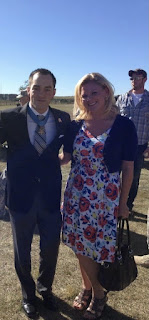Fort Carson - COP Keating
Located in southern Colorado Springs, Fort Carson was established in 1942 right after the attack on Pearl Harbor. The “mountain post” was named after scout and explorer Kit Carson. After World War II, Fort Carson was on the verge of closing until the onset of the Korean War resulted in a large expansion of activity. In the 1960s, more land was purchased for training in the Piñon Canyon area. According to the Military OneSource website (militaryonesource.mil), today, over 25,000 military members are assigned to Fort Carson. As one of five military installations in Colorado Springs, Fort Carson provides diversity and a large economic impact to the Pikes Peak Region. The mountain post supports more than 250 community events annually, such as parades, concerts, and fairs. You can’t drive through Colorado Springs without seeing the Fort Carson symbol or running into someone affiliated with the base.
Kit Carson - Photo Credit Carson.org
Many soldiers and civilians go in and out of Fort Carson every year. Some never return while others retire there.
Photo Credit U.S. Army
Right outside of Gate 1 at Fort Carson, visitors can learn about the history of the fort's major division—the 4th Infantry—and view exhibits and historical artifacts. Additionally, they can pay their respects at the Fallen Soldiers Memorial. Since 2004, Fort Carson has commemorated soldiers from the mountain post who have lost their lives fighting in the global war on terrorism. Each year, names are added to large flat stones that stand in the shadow of Cheyenne Mountain.
The names of those listed under the year 2009 stick out to me the most. At that time, I had been an Army wife for three years. Just 10 days after we were married, my now ex-husband was deployed to Iraq for 15 months. When he received orders to deploy again (this time to Afghanistan for a year) I thought it was going to be a piece of cake. If we could handle a 15-month deployment, then we could certainly handle a 12 month one. Unfortunately, this deployment turned out to be nothing like the first.
Months after he deployed, I had the news on the TV as I was getting ready for work.. The first headline read “Largest Battle in Afghanistan Since the Vietnam War.” As an Army wife, there are many things you learn. Two of the most important lessons are 1) never listen to the news and 2) no news is good news. Because of this, I did not let the segment get to me. Later, I would learn that this was the Battle of COP Keating.
During deployments, if an injury or casualty occurs overseas, all communication is shut down until families are notified. This is called a blackout. Blackouts don't last very long, and usually, I would hear from my ex every few days. (He preferred to communicate via email instead of over the phone, though I would get phone calls on special occasions like birthdays or anniversaries.) A week after the story broke, I had not heard from him, and I started to worry.
Combat Outpost Keating was a small base in Afghanistan surrounded by mountains and manned by about 53 soldiers from 3rd Squadron, 61st Cavalry Regiment of the 4th Brigade Combat Team, 4th Infantry Division. I recall an email that my ex sent asking for extra food and a pillow. Because supplies were hard to get to that area, he only received one hot meal a day and slept on plywood.
On October 3, 2009, the outpost came under attack by as many as 300 Taliban soldiers. During the battle, mortar rounds hit the main generator, cutting power to most of the camp. Enemy forces controlled the landing zone, which prevented the wounded from being airlifted out. At one point, the insurgents even controlled the ammunition supply point. To further complicate the situation, nearby Observation Post Fritsche was unable to provide mortar support to Keating, as it also was overrun by the Taliban. This 13-hour battle took the lives of eight American soldiers: Justin T. Gallegos, Christopher T. Griffin, Sergeant Joshua Mitchell Hardt, Sergeant Joshua John Kirk, Private First Class Stephan Lee Mace, Staff Sergeant Vernon W. Martin, Sergeant Michael P. Scusa, and Private First Class Kevin C. Thomson. This battle was the deadliest of the War in Afghanistan. Staff Sergeant Clinton Romesha and Sergeant Ty Carter received the Medal of Honor for their heroism that day.
This battle was the deadliest battle of the war in Afghanistan. The day the names of the fallen soldiers were released is a day that I will never forget. Right after I learned of the casualties, my emotions were conflicted; I was grateful my husband was ok (luckily, he wasn’t at COP Keating that day) but saddened by the loss of those brave men. Never before had a battle felt so real to me.
Back in Colorado Springs, Army wives gathered meals, child and pet care and did anything and everything we could to support the families. I remember we expressed our feelings in a Family Readiness meeting. Army wives come from all walks of life, but it was the military that brought us together and created a bond. We were there for each other when we needed it the most.
The film The Outpost is based on the events that occurred in the battle. The movie is based on the book The Outpost: An Untold Story of American Valor by journalist Jake Tapper. Staff Sergeant Romesha published his experiences in Red Platoon: A True Story of American Valor.
The memorial recognizing the lives lost at the Battle of COP Keating represents a particular time in my history, in Fort Carson’s history, and the history of Colorado.
With Staff Sergeant Romesha in 2013





Comments
Post a Comment